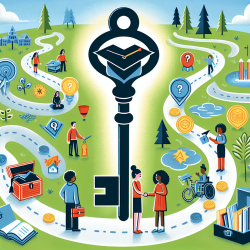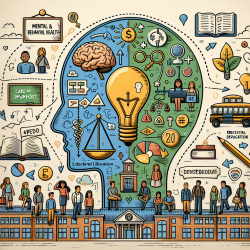Introduction
As a Special Education Director, I am constantly seeking ways to enhance the well-being of students and staff within our district. The research article "Happy but Unequal: Differences in Subjective Well-Being across Individuals and Space in Colombia" provides valuable insights that can be applied to improve educational and therapeutic practices. This blog post explores the key findings of the research and how they can be implemented to foster a more equitable and supportive environment for all students.
Understanding Subjective Well-Being
Subjective well-being (SWB) is a measure of how individuals perceive their quality of life. It encompasses factors such as life satisfaction, happiness, and perceived welfare. The research highlights that Colombia, despite being a relatively happy country, experiences significant inequality in SWB. This disparity is influenced by economic opportunities, education, and digital connectivity.
Key Findings and Their Implications
The research identifies several factors that contribute to SWB inequality in Colombia:
- Economic Opportunities: Economic security and job availability are crucial for enhancing SWB, particularly for the bottom 20% of the population.
- Education: Access to quality education is a significant determinant of SWB, with higher education levels correlating with increased well-being.
- Digital Connectivity: Access to digital resources is more strongly associated with the well-being of those in the lower SWB distribution.
- Geographical Disparities: There is a notable urban-rural divide, with urban areas generally reporting higher SWB levels.
Applying Research Insights to Improve Educational Practices
Incorporating these findings into educational and therapeutic practices can significantly impact the well-being of students, especially those in underserved areas. Here are some strategies to consider:
- Enhancing Economic Opportunities: Collaborate with local businesses and organizations to create internship and job shadowing opportunities for students, helping them gain valuable skills and experience.
- Improving Access to Education: Advocate for policies that support equitable access to quality education, including funding for schools in rural and peripheral regions.
- Expanding Digital Access: Implement programs that provide students with access to digital devices and the internet, ensuring they have the tools needed for modern learning.
- Addressing Geographical Disparities: Develop targeted interventions for students in rural areas, focusing on enhancing educational resources and support systems.
Encouraging Further Research and Collaboration
While the research provides valuable insights, it also highlights the need for ongoing investigation into the factors influencing SWB. Encouraging collaboration between educators, policymakers, and researchers can lead to more comprehensive solutions that address the root causes of inequality.
To read the original research paper, please follow this link: Happy but Unequal: Differences in Subjective Well-Being across Individuals and Space in Colombia.










